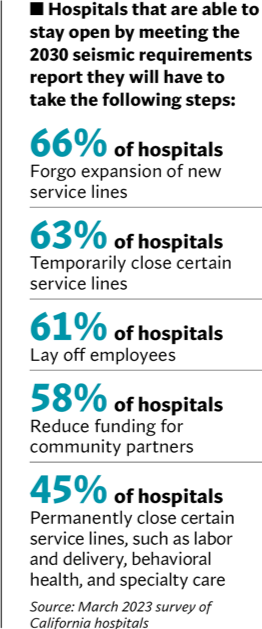Hospitals are Safe from Earthquakes, but Access to Health Care is at Risk
The Issue
Under current law, hospital buildings that do not meet the state’s 2030 seismic standards by Jan. 1, 2030, will be forced to close and patient care will cease in those buildings.
Patients and health care workers are safe — hospitals have already met a 2020 state standard and will stand after an earthquake. Hospitals are among the most seismically safe buildings in California, having spent billions of dollars to retrofit and rebuild facilities that protect workers and patients.
But nearly two-thirds of all hospitals — the primary centers for health care and among the largest employers in communities — have been unable to meet the 2030 seismic requirements that hospital buildings, be “fully operational” after an earthquake. These upgrades are estimated to cost hospitals $160 billion statewide. That cost will drive up health care costs in California.
Nearly all hospitals (98%) report that if they or a neighboring hospital must close or reduce services due to these requirements, patients will be at risk. Patients would experience longer wait times, there would be less hospital capacity during a crisis, and patients would have to travel farther for specialty services and emergency department care.

California’s finite pool of health care resources should be directed toward patient care first. At a time when more than half of the state’s hospitals lose money every day caring for patients, access to health care for all Californians must be the top priority.
What’s Needed
Hospitals need time and legislative change to make sure they can continue to meet communities’ needs following an earthquake. The deadline for seismic upgrades should be extended to provide the time needed to retrofit or rebuild buildings. California should take the lead and guarantee that every health care dollar is wisely invested in patient care.
Additionally, as the state works to hold health care costs in check, it must consider the impact $160 billion in hospital spending on infrastructure will have on health care costs. Directing the Office of Health Care Affordability to analyze the cost and impact will be critical to ensuring access to affordable care for all California communities.